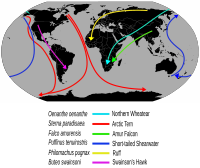
Using GPS tracking and stable multi-isotopes for estimating habitat use and winter range in Palearctic ospreys
Sign Up to like & getrecommendations! Published in 2021 at "Oecologia"
DOI: 10.1007/s00442-021-04855-5
Abstract: We used both satellite tracking and carbon, nitrogen and sulphur stable isotopic analysis (SIA) to infer wintering ecology and habitat use of the Corsican osprey Pandion haliaetus population. A control sample of feathers from 75… read more here.
Keywords: habitat; sia; habitat use; gps tracking ... See more keywords

Dust and bullets: Stable isotopes and GPS tracking disentangle lead sources for a large avian scavenger.
Sign Up to like & getrecommendations! Published in 2020 at "Environmental pollution"
DOI: 10.1016/j.envpol.2020.115022
Abstract: Lead intoxication is an important threat to human health and a large number of wildlife species. Animals are exposed to several sources of lead highlighting hunting ammunition and lead that is bioavailable in topsoil. Disentangling… read more here.
Keywords: lead sources; exposure; gps tracking; lead concentration ... See more keywords

Testing alternative methods for estimation of bird migration phenology from GPS tracking data
Sign Up to like & getrecommendations! Published in 2020 at "Ibis"
DOI: 10.1111/ibi.12809
Abstract: The development and miniaturization of GPS tracking devices has enabled a better understanding of migration phenology, but it can be challenging to identify where and when migration starts and ends, and researchers rely on multiple… read more here.
Keywords: alternative methods; migration phenology; gps tracking; migration ... See more keywords

GPS tracking data of Eurasian oystercatchers (Haematopusostralegus) from the Netherlands and Belgium
Sign Up to like & getrecommendations! Published in 2022 at "ZooKeys"
DOI: 10.3897/zookeys.1123.90623
Abstract: Abstract We describe six datasets that contain GPS and accelerometer data of 202 Eurasian oystercatchers (Haematopusostralegus) spanning the period 2008–2021. Birds were equipped with GPS trackers in breeding and wintering areas in the Netherlands and… read more here.
Keywords: netherlands belgium; oystercatchers haematopusostralegus; gps tracking; data eurasian ... See more keywords